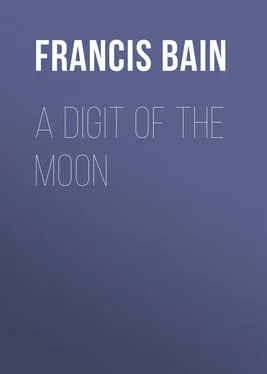Francis Bain - A Digit of the Moon
Здесь есть возможность читать онлайн «Francis Bain - A Digit of the Moon» — ознакомительный отрывок электронной книги совершенно бесплатно, а после прочтения отрывка купить полную версию. В некоторых случаях можно слушать аудио, скачать через торрент в формате fb2 и присутствует краткое содержание. Жанр: foreign_antique, foreign_prose, на английском языке. Описание произведения, (предисловие) а так же отзывы посетителей доступны на портале библиотеки ЛибКат.
- Название:A Digit of the Moon
- Автор:
- Жанр:
- Год:неизвестен
- ISBN:нет данных
- Рейтинг книги:4 / 5. Голосов: 1
-
Избранное:Добавить в избранное
- Отзывы:
-
Ваша оценка:
- 80
- 1
- 2
- 3
- 4
- 5
A Digit of the Moon: краткое содержание, описание и аннотация
Предлагаем к чтению аннотацию, описание, краткое содержание или предисловие (зависит от того, что написал сам автор книги «A Digit of the Moon»). Если вы не нашли необходимую информацию о книге — напишите в комментариях, мы постараемся отыскать её.
A Digit of the Moon — читать онлайн ознакомительный отрывок
Ниже представлен текст книги, разбитый по страницам. Система сохранения места последней прочитанной страницы, позволяет с удобством читать онлайн бесплатно книгу «A Digit of the Moon», без необходимости каждый раз заново искать на чём Вы остановились. Поставьте закладку, и сможете в любой момент перейти на страницу, на которой закончили чтение.
Интервал:
Закладка:
Notwithstanding the hints let fall by its former owner, I own I was dubious as to the value of my MS., for Hindoos will admire anything in Sanskrit. But when – after having redeemed it with difficulty from the ordeal of fire and the plague authorities by subjecting it to severe fumigations – I fell to examining it 6 6 A well written MS. in the Déwanágari character, is hardly if at all, inferior to print.
, I apologised to the manes of my old Brahman for doubting his judgment, and blessed him for his present, which is, I will venture to say, unique in literature. But I will leave the reader to judge of it for himself 7 7 At some future time I hope to translate the remainder, or part of it.
, warning him only that no language loses so much by translation as the Sanskrit; and advising him, for his own sake, to read it consecutively through, or he will lose much 8 8 Its principal beauty lies in the skill of its climax, which is lost by neglecting the order.
. I cannot refrain from observing, however, that it differs from the general run of classical Sanskrit productions in two very striking particulars – the simplicity of its style, and the originality of its matter. As to the last, every body knows that classical Sanskrit authors have no originality. They do but rhetorically reset and embellish notorious themes: such originality as they exhibit lying, not in their subject, but its treatment. Our author is an exception. Whoever he was, he must have possessed the gift of imagination: for though the plan of the story was doubtless suggested by the Wétála-panchawimshatiká , yet so novel and poetical is the use made of it that it may fairly claim to owe but little to its source, while all the particular stories are curious and original. The book differs, again, in a remarkable manner from other classical products of the Hindoo Muse in the simplicity of its style. The author would seem to have deliberately chosen the epic 9 9 The poem is written in shlókas , or anushtubh , with occasional deviations (as e.g. the conclusion) into more elaborate metres.
rather than the classic style as his model. We find here none of that artificiality, that straining and effort at style for its own sake, that perverse elaboration, those insipid intolerable shléhas and interminable compounds which reach a climax in the appalling concatenations of e.g. the Kédambarí . Mature Hindoo literature exhibits precisely the same tendency as its architecture: ornament is piled on ornament with aimless, tasteless extravagance, till the whole becomes nauseous, and all unity is smothered and annihilated under a load of rhetorical gewgaws. Just as the rank and luxuriant growth of a creeper will sometimes drain of its juices, dry up, and destroy the tree it was designed to adorn, so the over development of gaudy rhetorical blossoms and effeminate literary prettinesses has desiccated and broken the spring of the Hindoo mind. The best things in the literature are just those which are simplest, and therefore as a rule oldest. Literary arabesque nearly always indicates and springs from the absence of anything to say; a poverty of creative ideas. But our author has really a story to tell, and can therefore afford to exhibit it in naked unadorned simplicity.
Finally, the words which stand as a motto on the title-page have a history of their own. They are the closing lines of the Shakuntalá , and they mean, briefly: O Shiwa, grant that I may never be born again . There is a curiosa felicitas in their application to the conclusion of the story, where indeed I found them, scribbled in the margin by another hand; and though it cannot be proved, I am convinced that they were placed there by my old Brahman himself (who had Kálidás by heart), when he took his farewell of the MS., in an access of grief and despair at feeling his family annihilated and himself deprived of all that had made his life worth living, by the plague. Let us hope that the old man has had his wish, and that ' the purple-tinted god ' has ' destroyed his rebirth .'
Mahábaleshwar , 1898.
INTRODUCTION
10 10 Some such benedictory exordium as this is regarded as indispensable by every Sanskrit author: yet it is remarkable that Kálidás is careless of the rule; e. g. his Cloud and his Seasons begin at once without any invocation at all.
May the kindly three-eyed god[ 11 11 Shiwa.
], who stained his throat deep-purple by the draught of deadly poison which he swallowed for the preservation of the world, preserve you. May the Elephant-faced One 12 12 Ganésha or Ganapati. See Day 1.
sweep away with his trunk all impediments to my thoughts, and may Wání 13 13 Saraswatí, the goddess of speech.
inspire into my mind for every thought its proper word.
There lived formerly, in a certain country, a king, called Súryakánta 14 14 i. e. 'sun-beloved;' the name of a fabulous gem 'sunstone' (cp. 'moonstone'), said to possess magical properties and exhibit them when acted upon by the rays of the sun.
. And his armies, guided by Valour and Policy, had penetrated in all directions to the shore of the ocean, and his intellect had gone to the further shore of all the sciences, so that one thing only was unknown to him, woman, and the love of woman. He was, as it were, the very incarnation of the spirit of misogyny, beautiful exceedingly himself, to scorch with the hot rays of his glory the despairing hearts of all fair women who might chance to cast eyes upon him, yet himself cold as snow to their own melting glances. And as time went on, his ministers became full of concern for the future of the kingdom, for they said: The King has no son, and if he should die, everything will go to ruin for want of an heir. So they took counsel among themselves, and sending for them wherever they could find them, they threw in his way temptations in the form of beautiful women, raining on him as it were showers of the quintessence of all the female beauty in the world. But all was of no avail: for no matter what shape it took, the celestial loveliness of those ladies made no more impression on the King's mind than a forest leaf falling on the back of a wild elephant. Then the ministers fell into despair, exclaiming: Truly there is a point at which virtues become vices. It is well for a King to avoid the wiles of women; but out on this woman-hating king! the kingdom will be undone for him. And they took counsel again among themselves, and made representations to the King, exhorting him to marriage. But he would not listen to anything they could say. So being at their wits' end, they caused it to be bruited about without the King's knowledge, by means of their spies, that they would give a crore 15 15 Ten millions.
of gold pieces to any one who could produce a change in the mind of the King, and inspire him with an inclination for marriage. But though many charlatans presented themselves and performed incantations and other such devices, no one could be found able to effect the desired end. On the contrary, the King's hostility to the other sex increased so much, that he punished every woman who came within the range of his sight by banishing her from the kingdom. And in their fear lest the kingdom should be wholly deprived of its women, the ministers had to place spies about the King, who ran before him wherever he went, and made all the women keep out of his way. And this task was as difficult as standing on the edge of a sword, for all the women in the kingdom were drawn to see him by love and curiosity as if he were a magnet 16 16 A kind of play on the King's name: lóhakánta means a loadstone.
and they so many pieces of iron.
Интервал:
Закладка:
Похожие книги на «A Digit of the Moon»
Представляем Вашему вниманию похожие книги на «A Digit of the Moon» списком для выбора. Мы отобрали схожую по названию и смыслу литературу в надежде предоставить читателям больше вариантов отыскать новые, интересные, ещё непрочитанные произведения.
Обсуждение, отзывы о книге «A Digit of the Moon» и просто собственные мнения читателей. Оставьте ваши комментарии, напишите, что Вы думаете о произведении, его смысле или главных героях. Укажите что конкретно понравилось, а что нет, и почему Вы так считаете.












